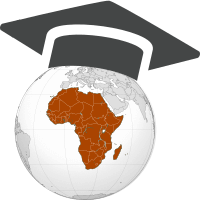African Universities World Representation
How many Universities are there in Africa? According to the uniRank database in 2023 there are currently 1,279 officially recognized higher-education institutions in Africa. Considering that the uniRank database includes a total number of 13,837 officially recognized higher education institutions the proportion of African Universities in the world is as follows:
-
uniRank African Universities World Representation Index: 9.2%
Being the estimated population of the African continent around 16,1% of the total world population (source: United Nations' World Population Prospects, the 2015 Revision), the African Higher education system and offerings seem to be strongly underrepresented in the world at least in terms of the number of higher education institutions.
Public vs Private Universities in Africa
How many public and private Universities are there in Africa? Out of the total number of 1,279 recognized higher education institutions in Africa included in the uniRank database, 586 (45.8%) are public (i.e. officially affiliated to or run by national, state or local governments) and 601 (47%) are private. The type of control of the remaining African Universities included in the uniRank database is unknown or it has not been reported (7.2%).
In terms of the number of public versus private Universities, the uniRank database shows a strong balance between public versus private higher education in the African continent as a whole. However, it is worth noting that 164 (82%) out of the top 200 Universities in Africa published by uniRank are public higher education institutions. Differences and peculiarities may still exist in each African country's higher education system.
Non-profit vs for-profit Universities in Africa
What type of entities are Universities in Africa? Out of the total number of 1,279 recognized higher education institutions in Africa included in the uniRank database, 661 (51.7%) are non-profit and 88 (6.9%) are for-profit. The type of entity of the remaining African Universities included in the uniRank database is unknown or it has not been reported (41.4%). As a general rule, the vast majority of African public higher education institutions are not-for-profit organizations, not necessarily in legal terms but certainly in terms of nature and institutional purposes such as role, scope and mission.
Challenges for the higher education systems in Africa
What are the main challenges that higher education in Africa currently faces? According to uniRank the higher education systems in Africa face a range of challenges that affect both the quality of education and the ability of institutions to meet the demands of students and employers. Here are some of the key challenges:
a) Access and affordability: many students in Africa still face significant barriers to accessing higher education due to factors such as poverty, distance and lack of infrastructure. Additionally, even for those who are able to attend, the cost of tuition and other expenses can be prohibitive.
b) Quality: while there have been significant improvements in the quality of higher education in Africa in recent years, there is still a wide variation in the quality of education across the continent. The quality of higher education in Africa is often criticized, with many universities struggling to maintain high academic standards. This is due to a lack of investment in research and infrastructure, as well as a shortage of qualified faculty.
c) Funding: in most of African countries there is inadequate funding for higher education.
d) Research and innovation: African universities have made significant strides in research and innovation in recent years, but there are still challenges related to funding, infrastructure and collaboration. Many institutions lack the resources needed to conduct cutting-edge research and translate that research into practical applications. That translates into a low research output and innovation.
e) Technology: technology is rapidly changing the landscape of higher education and institutions that fail to keep up risk falling behind. Many universities in Africa still face challenges in integrating technology into their teaching and learning, research and administrative functions.
f) Employability and relevance: graduates of African higher education programs often face challenges in finding employment that matches their skills and aspirations. Many African universities struggle to keep up with advances in teaching and research and some courses and programs may not be well-aligned with the needs of employers. Several African countries are, therefore, facing a skills gap, where graduates lack the skills that employers are looking for.
g) Internationalization: with increasing globalization, there is a growing demand for graduates who are globally competent and culturally aware. However, many African universities still face challenges in attracting and retaining international students and faculty, especially in those countries where English is not the chosen teaching language..
h) Harmonization: there is lack of harmonization of the higher education systems in the African continent as a whole.
i) Political and economic instability: political and economic instability in many African countries can have a significant impact on the higher education system. This can include disruptions to funding, safety concerns for students and faculty and challenges in attracting and retaining talented individuals.
Addressing these challenges will require a concerted effort from international and regional organizations, governments, universities and other stakeholders to invest in and reform higher education systems in Africa. This may involve increasing funding, improving infrastructure and technology, fostering harmonization and focusing on the development of relevant skills and knowledge for the workforce.
Top 200 Universities in Africa
uniRank publishes twice a year a non-academic university ranking of the top 200 Universities in Africa based on valid, unbiased and non-influenceable web metrics provided by independent web intelligence sources. Please read the ranking methodology on the About Us page for more information.

 Algeria
Algeria